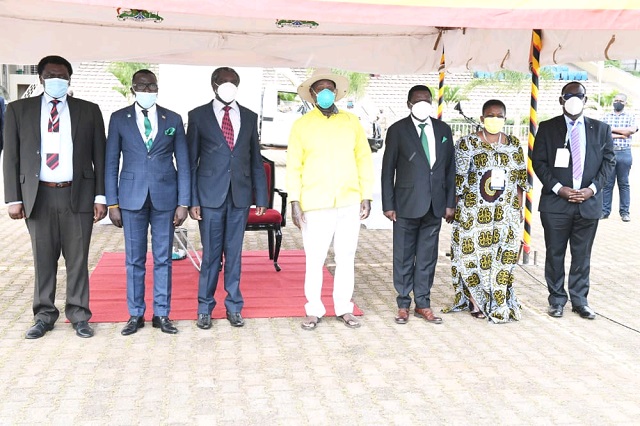
Kampala, Uganda | THE INDEPENDENT | The Inter-Party Organization for Dialogue-IPOD is in the process of drafting a new Memorandum of Understanding-MoU that binds all political parties with representation in Parliament. Four political parties namely the Democratic Party-DP, Forum for Democratic Change-FDC, National Resistance Movement-NRM and Uganda People’s Congress-UPC signed the first MoU in 2017.
Justice Forum-JEEMA joined the MoU later after the party president Asuman Basaalirwa won the Bugiri Municipality Parliamentary seat during the 2018 by-election. IPOD members are bound to principles of gender equity, inclusiveness, ownership, transparency, accountability, mutual respect and responsibility. The IPOD leadership is rotational and follows the alphabetical order with each member party steering the organization for six months.
The party president becomes the chairman of IPOD and the summit, which is the highest organ of IPOD comprising of Presidents of member parties. The 2017 MoU was scheduled to end in 2020 but was extended to complete the six months term of office of the National Resistance Movement-NRM which expired last month, June.
But as the Secretariat drafts a new understanding, questions arise of what the previous MoU has achieved. Fred Ebil, the Secretary-General of the UPC says that IPOD achieved 50 percent of its objectives and cited the unity of political parties during summits and council meetings as one of the major achievements.
So far, three summits have been convened and decisions taken. The decisions include increasing funding to political parties under the Political Parties and Organizations Act 2005 from Shillings 10 billion to 35 billion, sharing the money equally (not by numerical strength as provided for in the Act) during the campaign season.
However, some of the decisions have not been implemented. They include adopting clear regulations for the implementation of the Public Order Management Act 2013-POMA, which the state and security agencies were using to foil activities of opposition politicians.
Ebil says that the failure to implement the decisions should be blamed on heads of security and the office of the Prime Minister who are the implementers. He cites the example of the Security Council, which has until now failed to decide regulations regarding POMA.
The IPOD council drafted regulations and submitted them to the Security Council for perusal and approval before they are taken to parliament for final approval. However, until now, the Security Council has not presented the regulations to parliament.
The Secretary-General of JEEMA, Muhammad Kateregga says that IPOD has made relevant resolutions but failed at implementation. He also referred to the POMA regulations and suggested that IPOD be institutionalized by establishing it through an Act of Parliament.
“Institutionalization of IPOD will help in the implementation of resolutions of the summit. The biggest challenge has been that decisions are taken but nothing or so little is done to implement that. Perhaps if IPOD is formed by an Act of Parliament, the government will be more committed to implementing its resolutions,” said Kateregga.
The FDC Secretary-General, Nathan Nandala Mafabi says IPOD as it stands, is a joke because it doesn’t act independently. FDC has skipped three summits, saying that the resolutions taken are not respected by the implementers. Nandala says that currently IPOD is dependent upon funders and conducts activities as funded by its donors (Democratic Governance Facility), which affects the achievement of its goals.
“When funders say you should organize a youth conference, IPOD does that. That’s not how it should work. All parties should bring their objectives, we sit, come up with a plan and activities to conduct and then look for funding for activities we have set not those dictated by funders,” said Nandala.
According to Nandala, there is no clear accountability for the activities of IPOD. He says that FDC has previously written to IPOD funders demanding accountability but in vain.
The programs manager at IPOD Secretariat, Lawrence Serwambala says IPOD has achieved several objectives including dialoguing and resolving to increase money given to political parties. He acknowledges the gaps in implementation. Serwambala says they are considering institutionalization of IPOD with the hope that then its resolutions will be more respected by the members.
They also want to revise the quorum of the council to two-thirds of the members such that the absence of a one-member party at any point does not cripple the activities of the organization. The 2017 MoU put quorum at full membership and some parties like the FDC have been accused of absconding from council meetings when they disagreed.
Serwambala says when the draft is done, it shall be shared with all parties with representation in parliament for their input. He says the process might be concluded in late 2022. This year, the National Unity Platform Party-NUP which dominates the opposition in parliament will join IPOD. The other is the People’s Progressive Party-PPP.
*****
URN
 The Independent Uganda: You get the Truth we Pay the Price
The Independent Uganda: You get the Truth we Pay the Price



